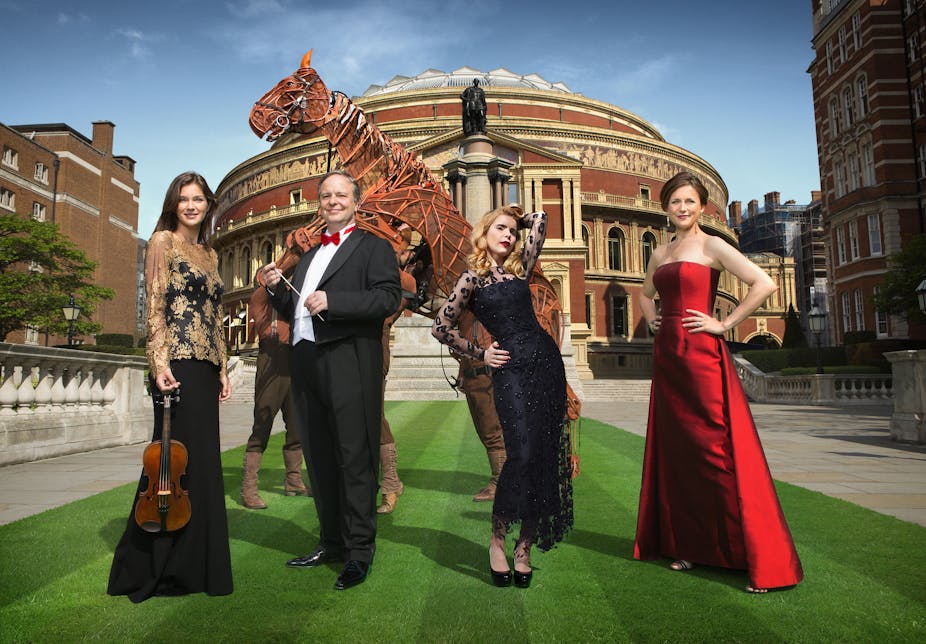The Proms are upon us again. For the next two months world-class classical music will fill the Royal Albert Hall, where standing tickets cost only £5 on the day. Failing that, our radio waves and various screens will also beam the summer sounds across the UK and indeed, around the world.
Founded by the impresario Robert Newman and the conductor Henry Wood in 1895, the idea of an indoor promenade series harked back to the 18th century pleasure gardens, around which audiences would walk (“se promener”) during outdoor performances.
Newman’s original mission statement is appropriately evocative of BBC founder John Reith:
I am going to run nightly concerts to train the public in easy stages. Popular at first, gradually raising the standard until I have created a public for classical and modern music.
Financial difficulties demanded the passing of control first to the music publisher Chappell and Co., and then in 1927 to the BBC. And so Newman and Wood’s original conception endures. Every Prom is now broadcast on Radio 3 and many may be seen on television too. Indeed, the Albert Hall’s problematic acoustics have led many to prefer the “best seat in the house” at home, although for many others the atmosphere of the hall cannot be beaten.
This is Roger Wright’s final season at the helm, before the Director of the Proms and Controller of Radio 3 – sometimes the posts are held by one person, sometimes by two – moves on.
At first sight, the offerings might seem less spectacular than those occasioned by 2013’s Wagner bicentenary extravaganza, the focal point of which was a Ring cycle from Daniel Barenboim, the Staatskapelle Berlin, and a host of world-class soloists. It put the Royal Opera to shame. But when you look more closely, there is a great deal to savour, whether for the fanatical, the generally interested, or the merely curious.
As with any such series, traditions will come, go, and, in some cases, be reinstated. Following a somewhat unsatisfactory experiment with the first night as something of a “tasting menu” for the rest of the season, Wright has returned to the tradition I recall as a child of presenting a large-scale choral work. In this case, we have Elgar’s oratorio for Pentecost, The Kingdom, composed a decade or so after Newman and Wood opened for business.
As ever, since the BBC took over, the BBC Symphony Orchestra and the other BBC orchestras continue to provide the backbone of the festival. But, the post-World War II tradition of visiting orchestras has continued to flourish. The Hallé Orchestra, then under Sir John Barbirolli, was the first orchestra from outside London to perform at the Proms, and it returns this year under its present music director, Sir Mark Elder. Appropriately, they come with a programme that certainly combines old and new: Beethoven, Berlioz, Elgar, and the London premiere of Helen Grime’s Near Midnight.

Wright has made a feature of international orchestras this year, inviting many which have never appeared before. In doing so he (perhaps not entirely coincidentally) presents a mild musical rebuke to the (joking or otherwise) jingoism of the Last Night of the Proms, which celebrates British tradition with patriotic hymn and flag waving aplomb.
Many have tried to scrap it; indeed Elder was dismissed as conductor for the Last Night in 1990 for his questioning its appropriateness during the first Gulf War. No one has yet succeeded. There are doubtless some members of the audience, whether in the hall or at home, who really do believe that Britannia should rule the waves and who, for that matter, signally fail to understand that in Jerusalem, Blake indicts rather than celebrates England as it is. But the Last Night is probably better understood as a culminating party. The pity is that it is often the only thing that the rest of the world sees, and so the impression that the Proms are more concerned with sea shanties than Stockhausen probably dominates.
This year, there will be welcomed no fewer than 24 non-British orchestras, including the China Philharmonic Orchestra, the Borusan Istanbul Philharmonic, the Lapland Chamber Orchestra and the Qatar Philharmonic, alongside more established ensembles such as Daniel Barenboim’s wonderful young West-Eastern Divan Orchestra, the Berlin Philharmonic with Sir Simon Rattle, and the Leipzig Gewandhaus Orchestra.
Selecting potential highlights is doubtless a fool’s errand, but I should tip very highly Bernard Haitink and the LSO in Mahler and Schubert, and a matinee performance of works by Sir Harrison Birtwistle, who celebrated his 80th birthday very recently.
Anniversaries, such as that for C P E Bach (300 this year) receive a nod, though bewilderingly, the Proms apes London’s opera companies in entirely ignoring Gluck’s tercentenary. Richard Strauss’s 150th birthday is commemorated, though in operatic terms, the three works chosen could hardly have been “safer”: Salome, Elektra, and, in the traditional annual visit from Glyndebourne, Der Rosenkavalier.
I could offer a long list of omissions: the three composers of the Second Viennese School muster one work between them, and Haydn, the “father of the symphony” is once again entirely, bafflingly absent. I find this especially sad because one of the best Haydn performances I have heard was at the Proms: the “Drum Roll” Symphony from the Vienna Philharmonic and Zubin Mehta.
The programme, national and international, ancient and modern, nevertheless remains enticing. And so Sir Henry Wood’s bust continues, physically and metaphorically, to receive its seasonal garland tribute.

